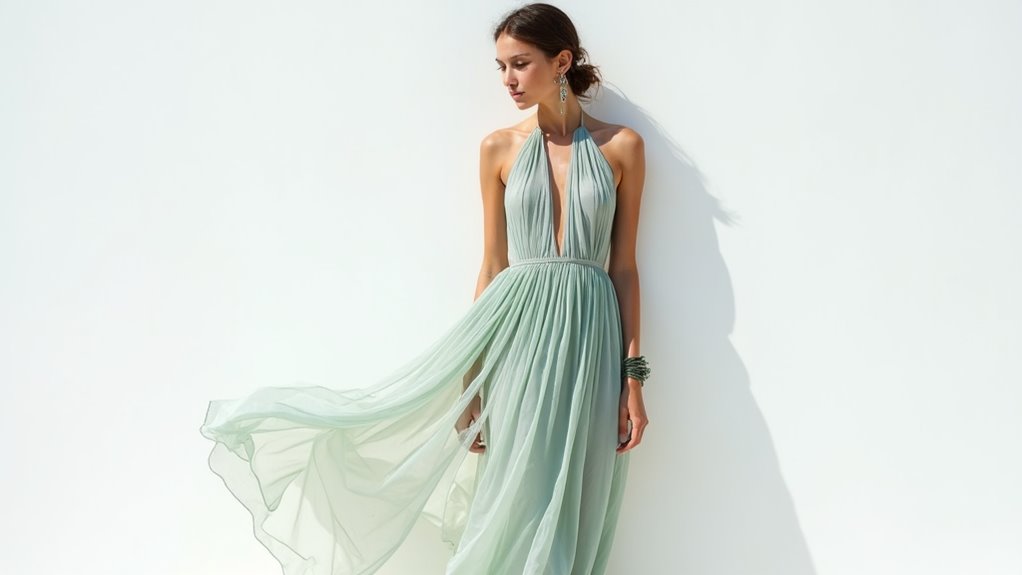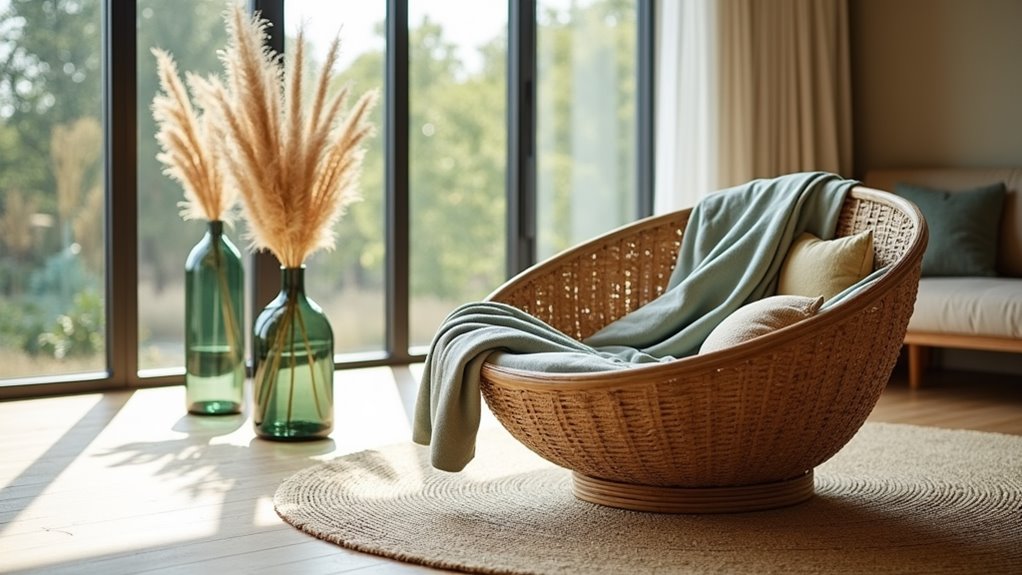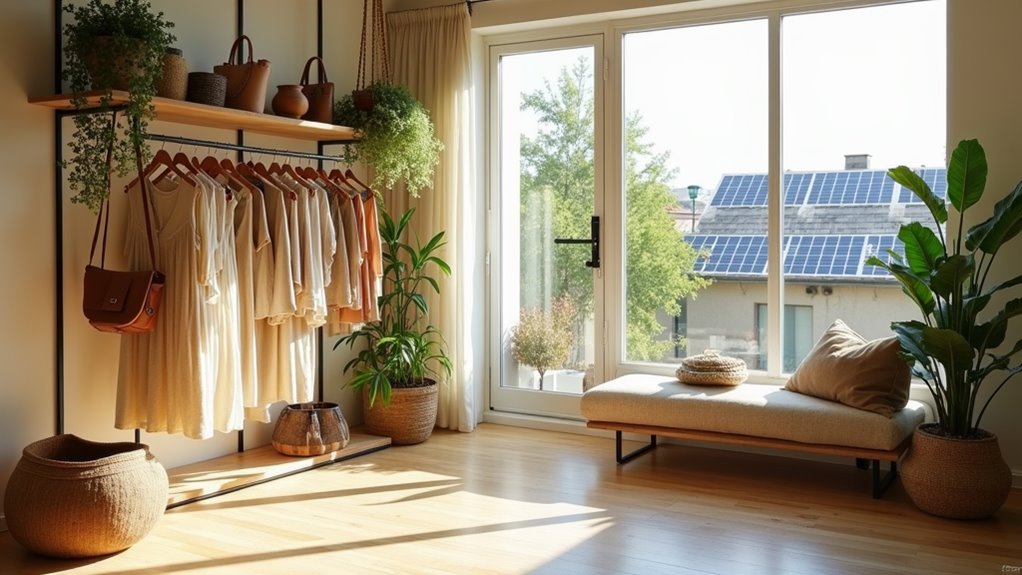You can embrace both style and sustainability in today's evolving fashion landscape. Leading brands like Stella McCartney and Reformation now offer chic designs using innovative eco-materials like mushroom leather, recycled ocean plastics, and organic textiles. Modern sustainable fashion features clean lines, versatile pieces, and transformable garments that maximize your wardrobe while minimizing environmental impact. Look for brands that prioritize transparent supply chains, fair labor practices, and carbon-neutral production. With AI-powered apps and digital tracking tools, you'll find it easier than ever to make conscious fashion choices that reflect your values and elevate your style.
Key Takeaways
- Modern sustainable fashion combines clean lines and modular elements with eco-friendly materials like Tencel, cork leather, and recycled polyester.
- Leading brands like Stella McCartney and Reformation prove sustainability can coexist with high-end design and contemporary style.
- Versatile, transformable garments maximize wardrobe functionality while minimizing environmental impact through smart construction techniques.
- Sustainable materials innovation enables stylish alternatives, from mushroom leather accessories to ocean plastic athletic wear.
- Digital technologies help conscious consumers track sustainability claims and find eco-friendly fashion that aligns with personal style preferences.
The Rise of Eco-Fashion

While fast fashion dominated the industry for decades, eco-fashion has emerged as a powerful movement reshaping how we think about clothing.
You'll find sustainable fashion focuses on environmentally friendly materials, ethical production methods, and lasting quality rather than disposable trends.
As you explore eco-fashion, you'll discover brands using organic cotton, recycled materials, and innovative fabrics made from bamboo or hemp.
These companies prioritize fair labor practices and transparent supply chains, ensuring workers receive fair wages and safe working conditions.
You're now part of a growing community that values both style and sustainability.
Sustainable Materials Making Waves
Innovation in sustainable materials is revolutionizing the fashion industry. You'll find cutting-edge fabrics made from recycled ocean plastics, pineapple leaves, and mushroom leather transforming the way we dress.
These alternatives aren't just eco-friendly – they're durable and stylish too. You can now choose from an array of sustainable options that rival traditional materials.
Tencel, created from wood pulp, offers a silky-smooth alternative to conventional fabrics. Cork leather provides a cruelty-free option that's water-resistant and long-lasting. Even your athletic wear can be eco-conscious with recycled polyester that's moisture-wicking and breathable.
These innovations aren't just passing trends. They're setting new standards for what's possible in fashion, proving you don't have to sacrifice style for sustainability.
Mindful Design Meets Modern Style

Sustainable materials are just the beginning of fashion's eco-friendly revolution. You'll find today's mindful designs focusing on versatility and longevity, creating pieces that transcend seasonal trends.
Modern designers are embracing clean lines, modular elements, and transformable garments that serve multiple purposes in your wardrobe.
You can now find clothing that's both stylish and adaptable – think reversible jackets, adjustable hemlines, and pieces that transition seamlessly from day to evening wear.
Smart construction techniques reduce fabric waste while creating interesting silhouettes. These innovative designs aren't just eco-conscious – they're pushing the boundaries of modern style.
Brands Leading Green Innovation
As consumers demand more eco-conscious options, several fashion brands have stepped up to revolutionize the industry.
You'll find Stella McCartney leading the charge with innovative vegan leather alternatives and zero-deforestation policies.
Patagonia continues to impress with its repair-and-reuse program, while Reformation's carbon-neutral operations set new standards for sustainable manufacturing.
You can also explore Everlane's radical transparency approach, which reveals the true costs and environmental impact of each garment.
Eileen Fisher's take-back program transforms old clothing into new designs, and Veja's sustainable sneakers prove that eco-friendly footwear can be stylish.
These brands aren't just selling products; they're creating blueprints for a more sustainable fashion future, showing that you don't have to sacrifice style for environmental responsibility.
The Future of Conscious Shopping

The evolution of conscious shopping extends far beyond these pioneering brands.
You'll soon find AI-powered apps that scan your wardrobe and suggest sustainable alternatives while tracking your carbon footprint. Digital passports for garments will let you trace their journey from source to store, ensuring ethical production at every step.
Smart fitting rooms will eliminate size uncertainty and reduce returns, while blockchain technology will verify authenticity and sustainability claims.
You'll access virtual wardrobes that let you try clothes digitally before purchasing, cutting down on waste. Rental subscriptions will become mainstream, and repair services will integrate seamlessly with retail platforms.
These innovations aren't just future possibilities – they're emerging realities that'll transform how you shop, making conscious consumption both effortless and engaging.
Frequently Asked Questions
How Can I Verify if a Brand's Sustainability Claims Are Genuine?
You can verify a brand's sustainability claims by checking for third-party certifications like B Corp, GOTS, or Fair Trade.
Research their supply chain transparency, look for concrete data about their environmental impact, and read independent reviews.
Don't just trust marketing materials – investigate their actual practices through sustainability reports and environmental watchdog organizations.
Be wary of vague claims without specific metrics or verification.
What's the Best Way to Dispose of Non-Sustainable Clothing Responsibly?
One person's trash is another's treasure!
You've got several eco-friendly options for clearing out your wardrobe. First, donate wearable items to local charities or thrift stores.
For damaged clothes, repurpose them into cleaning rags or craft materials. You can also find textile recycling programs that turn old fabrics into new materials.
If you're crafty, upcycle garments into something new, like turning jeans into a tote bag.
Are Sustainable Fashion Items Worth Their Higher Price Tags?
You'll find sustainable fashion's higher prices often justify themselves through superior quality and longevity. When you invest in well-made sustainable pieces, they'll typically last 3-4 times longer than fast fashion items.
You're also paying for fair labor practices, eco-friendly materials, and reduced environmental impact. Consider the cost-per-wear: a $100 sustainable shirt worn 50 times costs less per use than a $20 fast-fashion piece that wears out quickly.
How Do I Care for Eco-Friendly Fabrics to Make Them Last Longer?
You'll get more life from eco-friendly fabrics by washing them in cold water and air-drying when possible.
Turn your garments inside out before washing, use gentle detergents, and avoid fabric softeners that can degrade natural fibers.
Don't wash after every wear – simply air out items between uses.
Store your clothes in a cool, dry place away from direct sunlight to prevent fabric breakdown.
Can Sustainable Fashion Be Appropriate for Formal or Professional Settings?
Yes, you'll find many sustainable fashion options perfect for professional environments.
Look for well-tailored pieces made from organic wool, cotton, or recycled polyester that maintain traditional business aesthetics.
You can choose timeless designs like blazers, trousers, and dresses from eco-conscious brands that prioritize both style and sustainability.
Many luxury sustainable labels now create formal wear that's indistinguishable from conventional professional attire.
Conclusion
Like a butterfly emerging from its chrysalis, you're part of fashion's beautiful transformation. As you spread your wings in conscious consumerism, you're no longer choosing between style and sustainability – they've become one magnificent flight path. You'll soar ahead knowing your wardrobe choices ripple like waves, creating positive change with every mindful purchase. The future of fashion isn't just green; it's your masterpiece in the making.

Leave a Reply